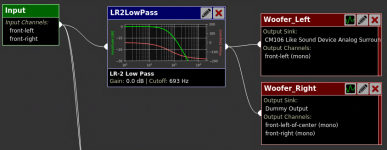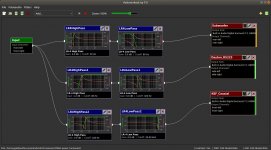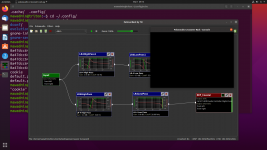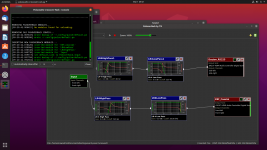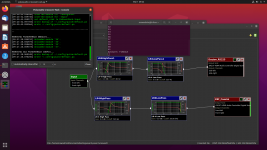Hi folks, new user here.
I've got the SW up and running with a Vantec 7.1 USB card on a Raspi 4.
I want to eventually output discrete 6 channel audio for a stereo pair of 3 ways.
Selecting just one channel for the woofer filter, for example leads to a dialog:
"You have selected only one channel, do you want to downmix to mono?"
Selecting NO and hitting OK brings me back to the same dialog.
Any tips?
I've got the SW up and running with a Vantec 7.1 USB card on a Raspi 4.
I want to eventually output discrete 6 channel audio for a stereo pair of 3 ways.
Selecting just one channel for the woofer filter, for example leads to a dialog:
"You have selected only one channel, do you want to downmix to mono?"
Selecting NO and hitting OK brings me back to the same dialog.
Any tips?
This behaviour is actually correct. pulseaudio can only output to as many channels on the sink as it has input channels. As PaXoverRack is made for stereo use (hardcoded), you MUST have either one output channel downmixed to mono (it appears as two then in the sink's channel list) or two separate channels. So if you don't click yes, the program cannot continue with one output channels selected.
May I ask, why you don't choose two output channels if you want to build a stereo 3-way - you will need two woofers anyway, right?
May I ask, why you don't choose two output channels if you want to build a stereo 3-way - you will need two woofers anyway, right?
Thanks Tfive - I think I see what you mean.
Even though I selected "front-left" for the woofer, I need to tell PAX to make that a mono channel, even though it's already mono. No biggie.
Now I've got another problem -
Loaded pulseaudio, and Audacious can play fine with output to pulseaudio.
pacmd info shows the USB audio device and channels, but PAX is now only showing "Dummy" sink for the new outputs.
Even though I selected "front-left" for the woofer, I need to tell PAX to make that a mono channel, even though it's already mono. No biggie.
Now I've got another problem -
Loaded pulseaudio, and Audacious can play fine with output to pulseaudio.
pacmd info shows the USB audio device and channels, but PAX is now only showing "Dummy" sink for the new outputs.
Attachments
maybe you set that when the usb soundcard was not attached? open the edit dialog again and see if you can set the output device and channels...
maybe you set that when the usb soundcard was not attached? open the edit dialog again and see if you can set the output device and channels...
yeah - at this time, the dialog for output sink is either blank and not selectable, or shows dummy. Pulseaudio on this Raspi with multichannel USB output is just flaky. Tried reinstalling pulseaudio and rebooting the Pi. Sometimes Audacious will output to Pulse, other times it refuses, so there is an underlying problem somewhere.
So, soliciting input from the group:
Is anybody running a Raspi w PAX and a multichannel USB sound card?
yeah - at this time, the dialog for output sink is either blank and not selectable, or shows dummy. Pulseaudio on this Raspi with multichannel USB output is just flaky. Tried reinstalling pulseaudio and rebooting the Pi. Sometimes Audacious will output to Pulse, other times it refuses, so there is an underlying problem somewhere.
So, soliciting input from the group:
Is anybody running a Raspi w PAX and a multichannel USB sound card?
Not currently but I did for a good while and I confirm that it works. I could fire it up if you need me to try something for you.
If it ain't broke.... 🙁
Hey T-5 and all,
I upgraded my perfectly functioning linux system to 20.04 a couple of days ago and ever since Pa Xover Rack has been acting up.
Immediately after the update I noticed the PAXOR interface take a long time to launch, load and insert configs. A couple of times it would freeze and I'd have to reboot but I'd eventually get it to insert.
I got a recommended OS update today and allowed it to run. Now it's worse... I was going to report that it's completely hanging, but in the middle of typing this post it inserted successfully.
Have you had any other reports of strange behavior in Ubuntu 20.04?
Thanks
Hey T-5 and all,
I upgraded my perfectly functioning linux system to 20.04 a couple of days ago and ever since Pa Xover Rack has been acting up.
Immediately after the update I noticed the PAXOR interface take a long time to launch, load and insert configs. A couple of times it would freeze and I'd have to reboot but I'd eventually get it to insert.
I got a recommended OS update today and allowed it to run. Now it's worse... I was going to report that it's completely hanging, but in the middle of typing this post it inserted successfully.
Have you had any other reports of strange behavior in Ubuntu 20.04?
Thanks
No, I will try to test it in a VM tomorrow. Just out of curiosity, could you post the shipped pulseaudio version? I suspect that that's the culprit here...
Sure. It's 13.99.1
No, I will try to test it in a VM tomorrow. Just out of curiosity, could you post the shipped pulseaudio version? I suspect that that's the culprit here...
You're serious, obviously. This depicts a prerelease version of 14.0. Sometimes I wonder if there are any sane people amongst release managers for distros at all...
Sorry for the rant, couldn't help it. I will try to look into it as promised.
Sorry for the rant, couldn't help it. I will try to look into it as promised.
Like I said in my topic above - "If it ain't broke..."
I've only been messing around with Linux for the past year or so, since stumbling across this thread and your software. It works so well, I've never looked back... I was just curious about Unubtu 20.04 so I upgraded without giving much thought to how it might affect my audio setup... Next time I'll back up 1st 🙂
I've only been messing around with Linux for the past year or so, since stumbling across this thread and your software. It works so well, I've never looked back... I was just curious about Unubtu 20.04 so I upgraded without giving much thought to how it might affect my audio setup... Next time I'll back up 1st 🙂
1. The value of you data is indicated by the number of backups you have of it
2. Though no backup per se, consider using a snapshotable file system like btrfs and it's user space companion, timeshift (again, no need for me to promote Linux mint here, but it has it preinstalled). this would have nagged you to make a system snapshot before upgrading and you would be able to fall back to it with a single click. AGAIN, SNAPSHOTTING IS NO BACKUP. NEITHER IS RAID.
3. If using FREE software, there's nobody to blame but yourself
4. Been there, done that. Since 22 years I always had a backup. Nowadays I have at least two. Didn't have one before that time, so I also had to learn the hard way. Lost a third of my precious music files back then, so it really hurt 🙂
2. Though no backup per se, consider using a snapshotable file system like btrfs and it's user space companion, timeshift (again, no need for me to promote Linux mint here, but it has it preinstalled). this would have nagged you to make a system snapshot before upgrading and you would be able to fall back to it with a single click. AGAIN, SNAPSHOTTING IS NO BACKUP. NEITHER IS RAID.
3. If using FREE software, there's nobody to blame but yourself
4. Been there, done that. Since 22 years I always had a backup. Nowadays I have at least two. Didn't have one before that time, so I also had to learn the hard way. Lost a third of my precious music files back then, so it really hurt 🙂
Hello Tfive,
first of all thank you for creating and maintaining Pulseaudio crossover rack. I have been using it for about a year without any issues. Until yesterday, when I decided to switch to Ubuntu 20.04 (I had 16.04 before). I tried to reproduce the problem and I hope you can help me figure out a solution.
My Setup: Three way active crossover for four way speaker (mid and tweeter still have a passive crossover). I'm using the HDMI port of a Nvidia GTX650 to get a multichannel PCM audio signal to a Denon 4520. Here is a screen shot of Paxor that has been working on my old HTPC:
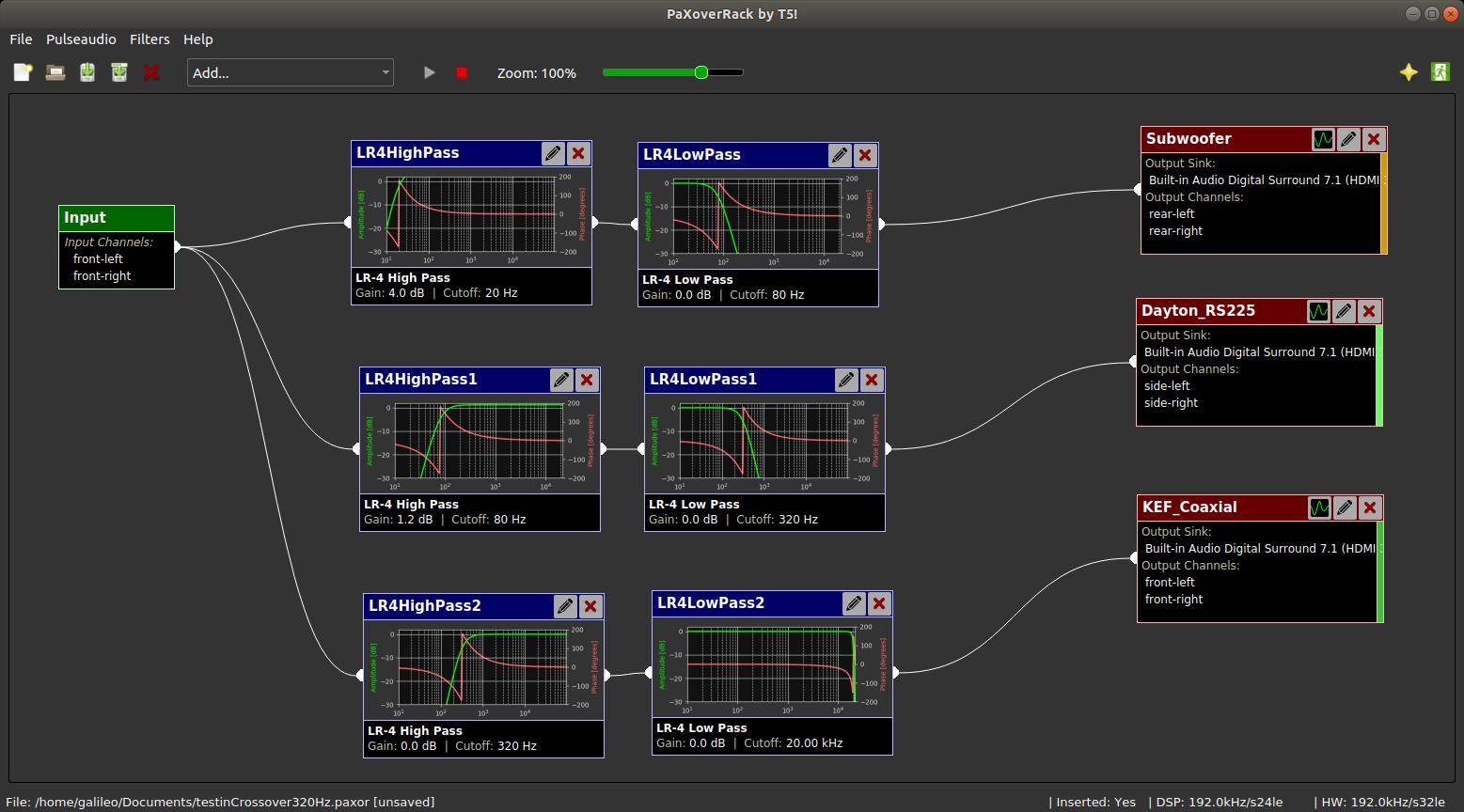
Now when I tried to use the same setup on Ubuntu 20.04 Pulseaudio crossover rack crashes and sometimes even the entire system freezes and I have to do a reboot. If I open up the sound settings the correct audio device is recognized and I can even test each individual driver. My Denon receiver says it is receiving a 7.1 PCM Signal with 192kHz sampling rate.
While trying investigate what exactly causes the problem I first created a minimal working example by using just one way of my loudspeaker to play music:
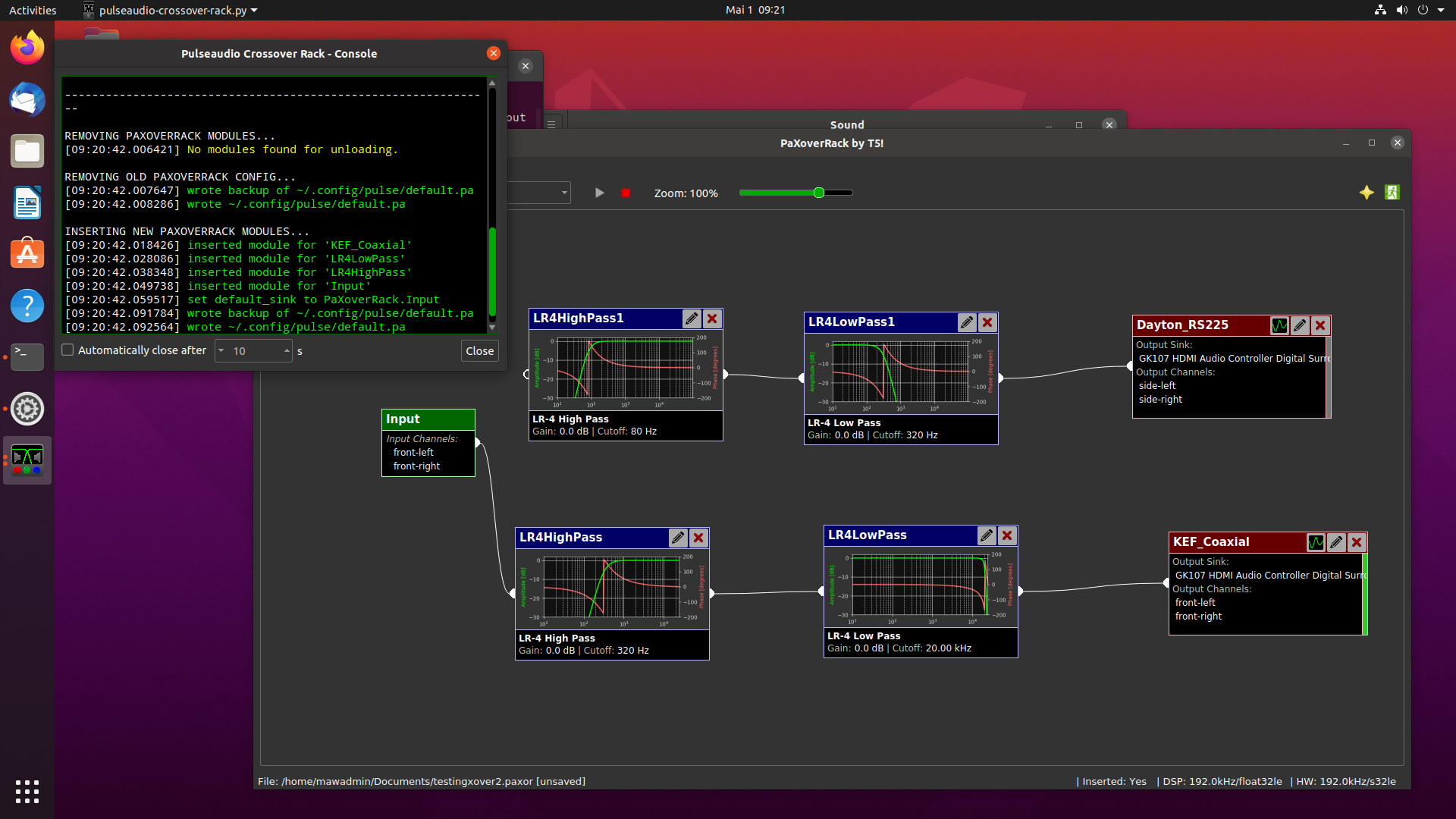
And this works! It is not depended on which loudspeaker drivers I use (Subs, lows, mid/tweeter) as long as there is only one way. But as soon as I add a second connection from Input to a second branch of crossovers the program and more often than not my entire computer freezes:
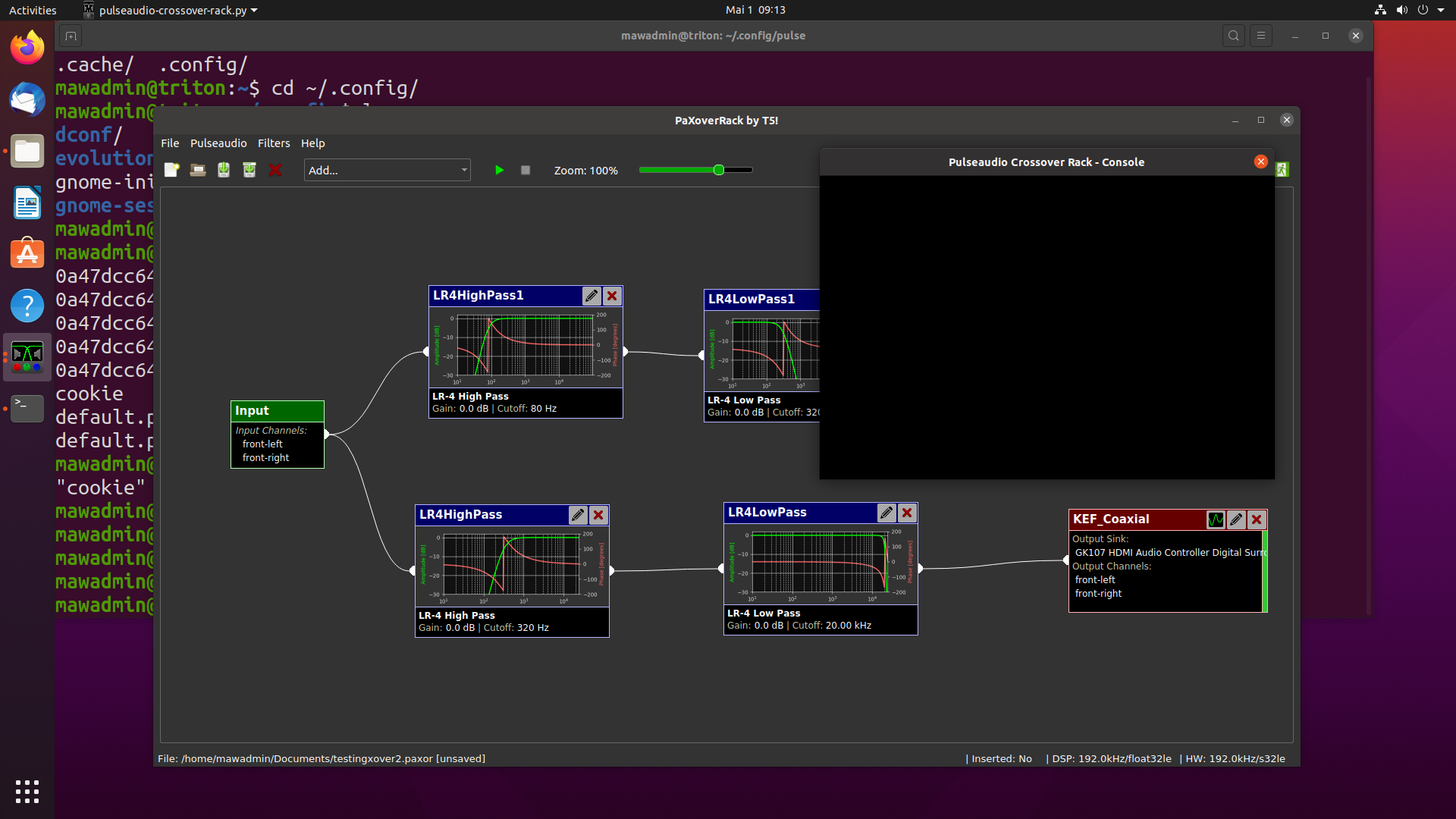
If I try to start Pulse audio crossover rack in a terminal I sometimes get a "Timeout error" on std😱ut:
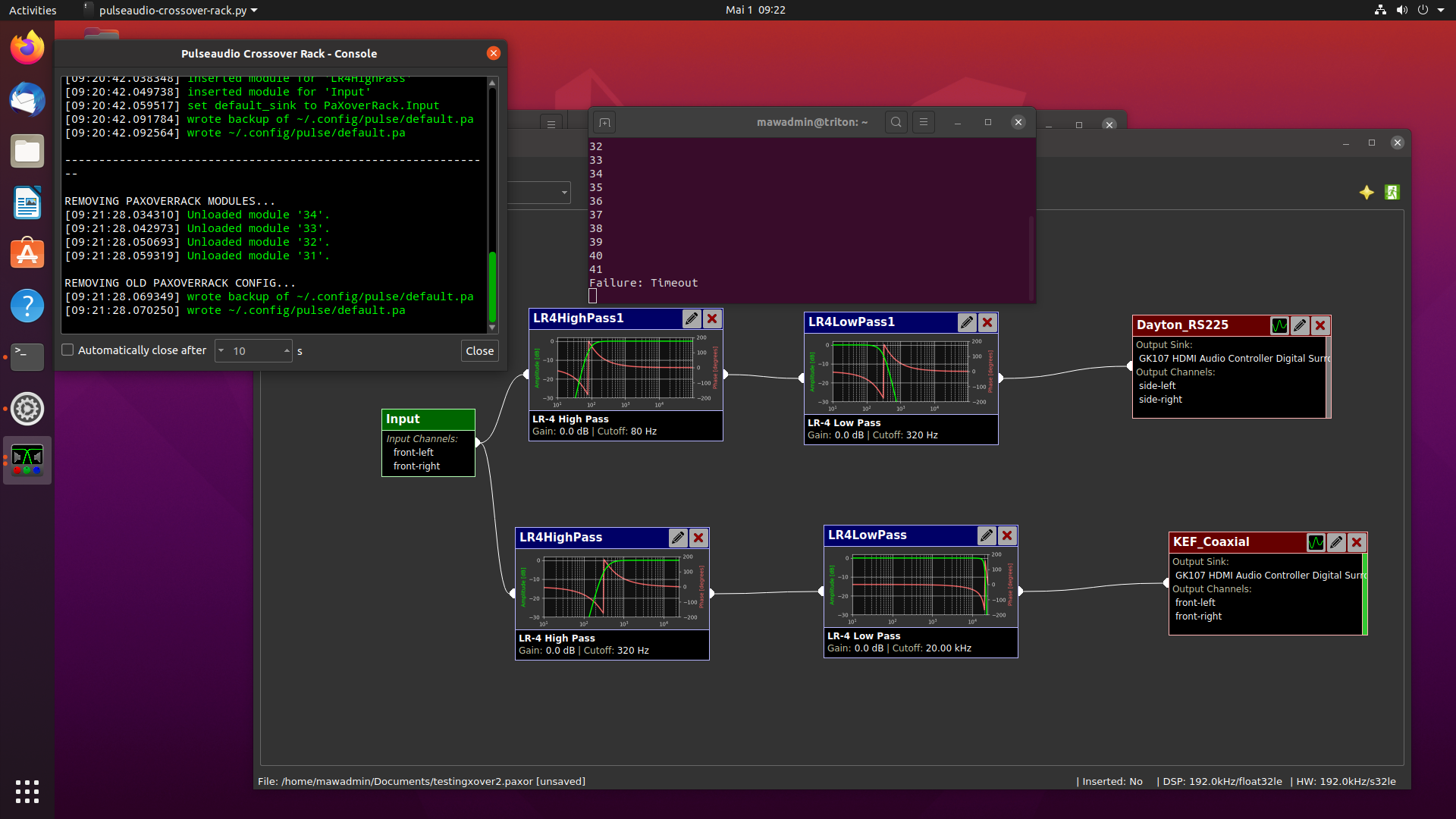
Do you have any idea what the cause is? I would really appreciate some help and if you need aplay -L or lspci outputs just let me know.
Thank you,
Mike
first of all thank you for creating and maintaining Pulseaudio crossover rack. I have been using it for about a year without any issues. Until yesterday, when I decided to switch to Ubuntu 20.04 (I had 16.04 before). I tried to reproduce the problem and I hope you can help me figure out a solution.
My Setup: Three way active crossover for four way speaker (mid and tweeter still have a passive crossover). I'm using the HDMI port of a Nvidia GTX650 to get a multichannel PCM audio signal to a Denon 4520. Here is a screen shot of Paxor that has been working on my old HTPC:
Now when I tried to use the same setup on Ubuntu 20.04 Pulseaudio crossover rack crashes and sometimes even the entire system freezes and I have to do a reboot. If I open up the sound settings the correct audio device is recognized and I can even test each individual driver. My Denon receiver says it is receiving a 7.1 PCM Signal with 192kHz sampling rate.
While trying investigate what exactly causes the problem I first created a minimal working example by using just one way of my loudspeaker to play music:
And this works! It is not depended on which loudspeaker drivers I use (Subs, lows, mid/tweeter) as long as there is only one way. But as soon as I add a second connection from Input to a second branch of crossovers the program and more often than not my entire computer freezes:
If I try to start Pulse audio crossover rack in a terminal I sometimes get a "Timeout error" on std😱ut:
Do you have any idea what the cause is? I would really appreciate some help and if you need aplay -L or lspci outputs just let me know.
Thank you,
Mike
Attachments
I tried Ubuntu several times, and each time I ended up switching to something else. The last attempt was when I set up my server something like 7 years ago. Ubuntu just refused to reliably mount my completely standard Raid array on boot. I got fed up and installed Debian which just worked. I run mostly Fedora now, except for the server which still runs Debian, and my work computer that has Arch. They all work very well.You're serious, obviously. This depicts a prerelease version of 14.0. Sometimes I wonder if there are any sane people amongst release managers for distros at all...
Sorry for the rant, couldn't help it. I will try to look into it as promised.
My suggestion: dump Ubuntu and switch to pretty much anything else...
Well, I've been running PAXoverRack w/Pop!OS for months and Lubuntu for the past few weeks (both Ubuntu-based) on an Atomic Pi which is a very-very cheap x86 based SBC and Ubuntu's been rock solid. I mean runs without a hickup doing float32/96k, whether playing local audio, DLNA, Bluetooth or receiving analog audio from a USB ADC source. Ubintu's been great.
I'm thinking that, just like SomeDude82 (above) my issue stems from switching to the new PulseAudio - which TFive alluded to. I'm guessing that whatever the issue is will be sorted out with the 14.0 release.
I'm thinking that, just like SomeDude82 (above) my issue stems from switching to the new PulseAudio - which TFive alluded to. I'm guessing that whatever the issue is will be sorted out with the 14.0 release.
Last edited:
Generally it is recommended to upgrade to new ubuntu LTS versions after their first upgrade (20.04.1). The fixed April release deadline does not go well with stability.
Nevertheless I understand they wanted to use the latest PA since this release will last for 5 more years.
Nevertheless I understand they wanted to use the latest PA since this release will last for 5 more years.
The last attempt was when I set up my server something like 7 years ago. Ubuntu just refused to reliably mount my completely standard Raid array on boot. I got fed up and installed Debian which just worked. I run mostly Fedora now, except for the server which still runs Debian, and my work computer that has Arch. They all work very well.
IMO 7 years ago was the time when ubuntu already adopted systemd while debian stable was still on sysvinit. I have had all sorts of problems with systemd and mounting on servers, always keeping fingers crossed when rebooting them. Debian has fully adopted systemd and is not better than ubuntu in this respect anymore, unfortunately. The problem (which I do not understand when considering RedHat's target group) is systemd team is more focused on adding new features than on paying maximum attention to maintaining stability.
The problem (which I do not understand when considering RedHat's target group) is systemd team is more focused on adding new features than on paying maximum attention to maintaining stability.
The problem is also that the systemd team abandoned the UNIX maxim of "do one and only one thing, and do it well" and instead went for the GNU EMACS approach of "any complicated program at some point devolves into attempting to replace the whole operating system". 🙂
Generally it is recommended to upgrade to new ubuntu LTS versions after their first upgrade (20.04.1). The fixed April release deadline does not go well with stability.
Nevertheless I understand they wanted to use the latest PA since this release will last for 5 more years.
I think this is exactly the problem. They want the latest and greatest versions of everything and they want to release according to a fixed schedule. I don't think you can have both and still end up with a stable and well-tested result.
I'm in the process of downloading the ubuntu iso.
But from what SomeDude82 found out i suspect the module-combine-sink is acting up - it does the job of splitting to two input sinks. The module has been acting up for me a lot of times. All the stuttering and desynchronization of audio is most likely to blame on this one as well. If somebody wants to speed up debugging, please start pulseaudio in verbose mode on the console. You will have to set autospawn to no in /etc/pulseaudio/client.conf to do this. Post your output via a pastebin please.
But from what SomeDude82 found out i suspect the module-combine-sink is acting up - it does the job of splitting to two input sinks. The module has been acting up for me a lot of times. All the stuttering and desynchronization of audio is most likely to blame on this one as well. If somebody wants to speed up debugging, please start pulseaudio in verbose mode on the console. You will have to set autospawn to no in /etc/pulseaudio/client.conf to do this. Post your output via a pastebin please.
- Home
- Source & Line
- PC Based
- Pulseaudio Crossover Rack - multi-way crossover design & implementation with linux
